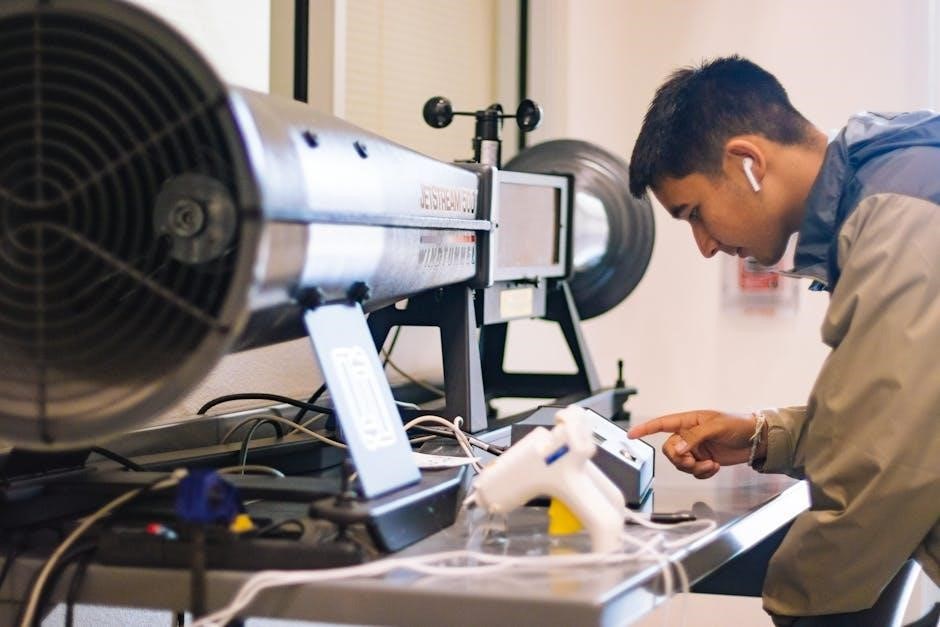AP Calculus BC practice exams are essential for assessing readiness and improving skills. They mirror the actual test format‚ helping students identify weak areas and refine their strategies.
What is the AP Calculus BC Exam?
The AP Calculus BC Exam is a rigorous‚ college-level assessment designed to measure a student’s mastery of calculus concepts and their ability to apply them to complex problems. It is divided into two sections: Section I‚ which includes 45 multiple-choice questions‚ and Section II‚ featuring free-response questions that require detailed solutions. The exam covers a wide range of topics‚ including differential calculus‚ integral calculus‚ parametric and polar functions‚ and series. Students have three hours to complete the exam‚ with Section I lasting 90 minutes and Section II 90 minutes. The exam is scored on a scale of 1 to 5‚ with scores of 4 or 5 often qualifying students for college credit. Taking official practice exams‚ such as the 2015 or 2016 administrations‚ helps students familiarize themselves with the exam format and content‚ ensuring they are well-prepared for the actual test.

Why Practice Exams are Essential for Preparation
Practice exams are crucial for AP Calculus BC preparation as they simulate the actual test environment‚ helping students assess their understanding and identify weak areas. They familiarize students with the exam format‚ including multiple-choice and free-response sections‚ and improve time management and problem-solving skills. By taking practice exams‚ students can gauge their readiness‚ clarify doubts‚ and refine their strategies. Official practice exams‚ such as those from the 2015 or 2016 administrations‚ provide realistic feedback‚ boosting confidence and ensuring students are well-prepared for the challenges of the actual exam.
How to Use Practice Exams Effectively
To maximize the benefits of AP Calculus BC practice exams‚ students should simulate exam conditions‚ such as timing and environment‚ to build stamina and focus. After completing a practice exam‚ review the answer key to identify incorrect answers and understand the reasoning behind each solution. Use the scoring guidelines to calculate your score and assess your performance. Focus on weak areas by revisiting relevant topics in your study materials. Regularly take practice exams to track progress and refine test-taking strategies. Additionally‚ utilize official resources‚ such as the 2015 or 2016 practice exams‚ to ensure familiarity with the exam format and question styles.

Where to Find AP Calculus BC Practice Exams
Official practice exams are available on the College Board website‚ while PDFs and additional resources can be found on platforms like AP Study Notes and Reddit forums.
Official College Board Resources
The College Board provides authentic AP Calculus BC practice exams‚ including PDFs from past administrations (2012-2017)‚ which are ideal for realistic preparation. These resources include multiple-choice and free-response questions‚ along with answer keys and scoring guidelines. Teachers can download these materials for classroom use‚ ensuring students practice under exam-like conditions. The official practice exams are meticulously designed to mirror the actual test format‚ helping students familiarize themselves with question types and timing. Additionally‚ the College Board offers detailed instructions and scoring distributions to enhance understanding and improvement. These resources are the most reliable for targeted practice and are available for free on the College Board website.
Unofficial Practice Exams and PDFs
Beyond official resources‚ unofficial AP Calculus BC practice exams and PDFs are widely available online. Websites like GitHub‚ Reddit forums‚ and educational platforms offer free downloadable materials. These exams are often created by teachers or students and mimic the actual test format. While they may not be identical to College Board exams‚ they provide additional practice opportunities. Many unofficial PDFs include answer keys and solutions‚ allowing for self-assessment. However‚ their quality and accuracy may vary‚ so it is important to use them as supplementary tools alongside official resources. They are a valuable option for students seeking extra practice material to refine their calculus skills.

Popular Websites and Forums for Download
Several websites and forums offer free AP Calculus BC practice exams and PDFs for download. Popular platforms include Reddit communities like r/APCalculus‚ where students and teachers share resources. Educational forums and GitHub repositories often host collections of past exams and practice materials. Additionally‚ websites like Course Hero and Chegg provide access to practice tests‚ though some may require subscriptions. Many teachers and educators also share PDFs of practice exams on their personal or school websites. These platforms are valuable for accessing a wide range of practice materials‚ ensuring students can prepare thoroughly for the exam. Always verify the credibility of the source for accuracy.

Structure of the AP Calculus BC Exam
The exam consists of two sections: Section I (45 multiple-choice questions) and Section II (6 free-response questions). Section I is 1 hour and 45 minutes‚ while Section II lasts 3 hours. The multiple-choice section accounts for 50% of the score‚ and the free-response section accounts for the remaining 50%. This structure tests both computational skills and conceptual understanding‚ ensuring a comprehensive assessment of calculus knowledge.
Section I: Multiple-Choice Questions
Section I of the AP Calculus BC Exam consists of 45 multiple-choice questions divided into two parts. Part A contains 30 questions‚ and calculators are not allowed. Part B has 15 questions‚ and calculators may be used. This section tests students’ ability to apply calculus concepts‚ interpret graphs‚ and solve problems efficiently. Questions cover a wide range of topics‚ including differential calculus‚ integral calculus‚ and parametric/polar functions. Students have 1 hour and 45 minutes to complete this section‚ which accounts for 50% of the total exam score. Accurate time management and strategic guessing are crucial for success in this fast-paced portion of the exam.
Section II: Free-Response Questions
Section II of the AP Calculus BC Exam includes 6 free-response questions‚ designed to assess a student’s ability to apply calculus concepts in-depth. These questions may involve proofs‚ applications‚ or interpretative skills‚ requiring clear and detailed solutions. Students are allowed to use calculators for this section‚ which accounts for 50% of the total exam score. The section is timed for 90 minutes‚ emphasizing the importance of organizing thoughts and managing time effectively. Practice exams highlight the need to show all work‚ as partial credit is awarded for correct reasoning. This portion tests not only knowledge but also the ability to communicate mathematical ideas clearly and concisely.
Timing and Weightage of Each Section
The AP Calculus BC Exam is divided into two sections‚ each with distinct timing and weightage. Section I‚ containing 45 multiple-choice questions‚ lasts 1 hour and 45 minutes and accounts for 45% of the total score. Section II‚ with 6 free-response questions‚ is timed for 90 minutes and contributes 55% to the final score. Understanding the timing and weightage of each section is crucial for effective time management during the exam. Practice exams help students familiarize themselves with these constraints‚ ensuring they allocate their time wisely to maximize their performance. This balance between speed and accuracy is key to success on the exam. Proper preparation is essential to manage the time effectively and score well.

Key Topics Covered in AP Calculus BC
AP Calculus BC covers differential calculus‚ integral calculus‚ parametric/polar functions‚ and series. These topics are essential for solving problems in multiple-choice and free-response sections of the exam.
Differential Calculus and Applications
Differential calculus focuses on understanding rates of change and slopes of curves. Key topics include derivatives‚ differentiation rules‚ and applications like motion along a line‚ optimization‚ and related rates. Students must master concepts such as limits‚ continuity‚ and the Fundamental Theorem of Calculus. Applications involve solving real-world problems‚ like maximizing area or minimizing distance. Practice exams highlight these areas‚ ensuring students can apply derivatives to solve complex scenarios efficiently. Understanding concavity‚ inflection points‚ and curve sketching is also critical for tackling free-response questions. These skills are foundational for both the multiple-choice and free-response sections of the AP Calculus BC exam.
Integral Calculus and Techniques
Integral calculus involves the study of accumulation and area under curves. Key concepts include definite and indefinite integrals‚ the Fundamental Theorem of Calculus‚ and integration techniques like substitution and integration by parts. Students practice applying integrals to solve problems involving area‚ volume‚ and work. Mastery of improper integrals‚ numerical integration‚ and parametric equations is also essential. Practice exams emphasize these areas‚ ensuring students can tackle both straightforward and complex integration problems. The ability to choose the right technique and apply it correctly is critical for success in both multiple-choice and free-response sections of the AP Calculus BC exam.
Parametric and Polar Functions
Parametric and polar functions are critical components of the AP Calculus BC curriculum. Parametric equations involve expressing x and y in terms of a third variable‚ often t‚ and require techniques for differentiation and integration. Key concepts include arc length‚ velocity‚ and acceleration. Polar functions‚ represented as r = f(θ)‚ involve calculating areas‚ slopes‚ and integrals in polar coordinates. Practice exams frequently include problems that test the ability to convert between Cartesian and polar forms‚ compute areas of polar regions‚ and analyze parametric curves. Mastering these topics is essential for success in both the multiple-choice and free-response sections of the exam.

Tips for Taking the AP Calculus BC Practice Exam
Creating a study schedule‚ simulating exam conditions‚ and reviewing mistakes are crucial strategies for excelling on the AP Calculus BC practice exam.
Creating a Study Schedule
Developing a structured study schedule is vital for mastering AP Calculus BC. Start by breaking down the curriculum into manageable topics‚ allocating specific time slots for differential calculus‚ integral calculus‚ and parametric functions. Set realistic milestones and deadlines‚ ensuring consistent progress. Incorporate regular practice exams to assess understanding and identify gaps. Allow time for review and correction of mistakes‚ as this reinforces learning. A well-organized schedule helps reduce exam anxiety and builds confidence. Tailor your plan to suit your learning pace‚ ensuring a balance between practice problems and conceptual understanding; Regularly update your schedule to reflect progress and focus on weaker areas. Consistency and discipline are key to achieving success.
Simulating Exam Conditions
Simulating exam conditions during practice is crucial for building stamina and familiarity with the test format. Set a timer for each section‚ adhering strictly to the allocated time. For Section I‚ practice without a calculator‚ as this mirrors the actual exam rules. Create a quiet‚ distraction-free environment to mimic test-day conditions. Taking full-length practice exams helps students manage their time effectively and reduces anxiety. Reviewing mistakes under timed conditions also enhances problem-solving skills. By replicating the exam experience‚ students can better prepare for the pressure and pacing required. This approach ensures they are mentally and strategically ready for the real AP Calculus BC exam.
Reviewing Mistakes and Learning from Them
Reviewing mistakes is a critical step in improving performance on AP Calculus BC practice exams. After completing a practice test‚ students should carefully analyze each incorrect answer using the provided answer key and scoring guidelines. Understanding the reasoning behind mistakes helps identify gaps in knowledge or problem-solving strategies. Categorizing errors by topic or type allows for targeted review and practice. Additionally‚ reflecting on time management during the exam can highlight areas for improvement. By learning from mistakes‚ students can refine their techniques‚ address weaknesses‚ and build confidence. Regular review of errors ensures that lessons are learned and applied to future practice‚ ultimately leading to better performance on the actual exam.

Analyzing Your Practice Exam Results
Examining practice exam results helps students understand their performance‚ identify strengths and weaknesses‚ and track progress. By reviewing scores and feedback‚ learners can refine their study strategies for better results.
Understanding the Scoring System
The AP Calculus BC exam uses a standardized scoring system to ensure fairness and consistency. The exam is scored on a scale of 1 to 5‚ with 5 being the highest. Section I‚ which includes 45 multiple-choice questions‚ accounts for 45% of the total score. Section II‚ containing 6 free-response questions‚ makes up the remaining 55%. Each free-response question is scored by trained readers who follow precise rubrics. Understanding this system helps students interpret their practice exam results accurately‚ identifying areas where they excel and where improvement is needed. This knowledge is crucial for refining study strategies and achieving a high score on the actual exam.
Identifying Weak Areas
Practice exams are invaluable for pinpointing areas where additional focus is needed. By reviewing mistakes‚ students can identify gaps in their understanding of calculus concepts. Free-response questions often reveal weaknesses in applying formulas or interpreting graphs‚ while multiple-choice errors may highlight misunderstandings of key theorems. Tracking patterns of incorrect answers helps target specific topics‚ such as parametric equations or optimization problems‚ for further study. This targeted approach ensures that study time is used efficiently‚ addressing only the most challenging aspects of the curriculum. Regularly analyzing practice exam results allows students to refine their skills and build confidence before the actual test.
Adjusting Your Study Plan
After identifying weak areas through practice exams‚ it’s crucial to adjust your study plan to address these gaps. Focus on the specific calculus topics where you struggled‚ such as parametric equations or series convergence. Allocate more time to reviewing relevant textbook sections‚ online tutorials‚ or seeking help from teachers. Prioritize problem types that were challenging and incorporate additional practice questions targeting those areas. Regularly reassess your progress by taking shorter practice tests to measure improvement. Adjusting your study plan ensures that your efforts are focused and efficient‚ leading to better performance on the actual AP Calculus BC exam. Consistent practice and strategic adjustments are key to success.

Additional Resources for AP Calculus BC Preparation
Supplement your study with official College Board materials‚ online platforms like Khan Academy‚ and practice exams. Join study groups or forums for collaborative learning and support.
Official Study Guides and Textbooks
Official AP Calculus BC study guides and textbooks are indispensable resources for comprehensive preparation. The College Board provides detailed study materials‚ including practice exams and solutions‚ to help students master calculus concepts. These guides align perfectly with the exam format‚ offering insights into question types and scoring criteria. They include sample questions‚ step-by-step explanations‚ and strategies for tackling challenging problems. Textbooks like Calculus by James Stewart or AP Calculus BC by William McClenahan are highly recommended for in-depth understanding. These resources are available on the College Board website or major bookstores. Using official materials ensures students are well-prepared for the exam’s unique demands and timing constraints.
Online Platforms and Tutorials
Online platforms and tutorials provide flexible and accessible ways to prepare for the AP Calculus BC exam. The College Board offers official digital resources‚ including practice exams and video tutorials‚ to help students master calculus concepts. Khan Academy‚ in partnership with the College Board‚ provides free personalized study plans and interactive exercises. Other platforms like Chegg‚ Coursera‚ and Udemy offer comprehensive courses and practice materials. Additionally‚ websites like MIT OpenCourseWare and Wolfram Alpha provide valuable resources for calculus review. These tools are ideal for self-paced learning and can be used alongside traditional study materials to reinforce understanding and improve problem-solving skills.

Joining Study Groups and Forums
Joining study groups and forums can significantly enhance your AP Calculus BC preparation. Platforms like Reddit’s r/APCalculus and specialized math forums offer spaces to discuss challenging topics‚ share resources‚ and collaborate on practice problems. Study groups provide peer support‚ allowing you to learn from others’ strengths and gain new perspectives. Many online communities share free or paid resources‚ including PDFs of practice exams and detailed solutions. Engaging in these forums helps you stay motivated‚ identify common pitfalls‚ and refine your problem-solving strategies. Participating in discussions also allows you to clarify doubts and gain insights from experienced students and teachers.
AP Calculus BC practice exams are essential for success. Consistently practicing with these resources sharpens skills‚ boosts confidence‚ and ensures readiness for the actual exam.
Final Tips for Success
Mastering AP Calculus BC requires consistent practice and strategic preparation. Regularly review concepts‚ focusing on weak areas identified through practice exams. Time management during the test is crucial‚ so practice pacing yourself. Seek guidance from teachers or tutors to clarify doubts. Stay organized by maintaining a study schedule and tracking progress; Utilize active learning techniques‚ such as solving problems aloud or teaching concepts to others. Additionally‚ incorporate breaks and physical activity to maintain mental clarity. Confidence grows with preparation‚ so stay motivated and remind yourself of your goals. Finally‚ ensure a good night’s sleep before the exam to perform at your best.
Staying Motivated and Confident
Remaining motivated and confident is vital for excelling in AP Calculus BC; Track your progress through practice exams to see improvement‚ which boosts morale. Break study material into manageable parts to avoid feeling overwhelmed. Celebrate small milestones‚ like mastering a difficult concept‚ to stay positive. Surround yourself with supportive peers or mentors who encourage your efforts. Maintain a growth mindset‚ believing in your ability to learn and grow. Stay organized‚ set realistic goals‚ and remind yourself of the importance of this exam for your future. Finally‚ ensure adequate rest and nutrition to maintain mental clarity and energy. Confidence and motivation will naturally follow consistent effort and preparation.
Best of Luck on Your Exam!
As you approach your AP Calculus BC exam‚ remember that thorough preparation and consistent practice have equipped you with the tools to succeed. Stay calm‚ trust in your abilities‚ and approach each question with confidence. The practice exams you’ve completed have provided valuable insights‚ helping you refine your problem-solving skills and time management. Believe in the effort you’ve put into studying and reviewing key concepts. Your hard work will shine through on exam day. Keep a positive mindset‚ stay focused‚ and give it your all—this is your moment to excel. Wishing you the very best of luck on your AP Calculus BC exam!